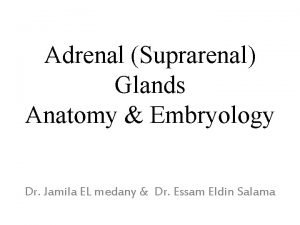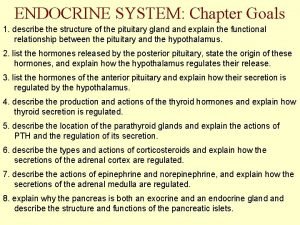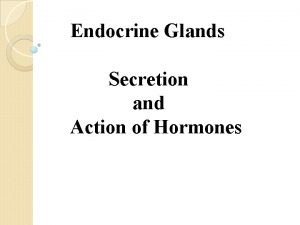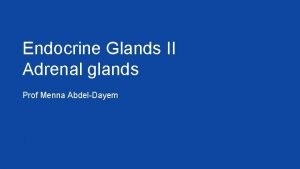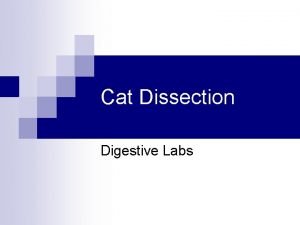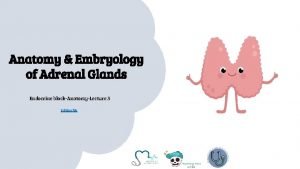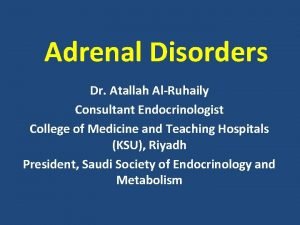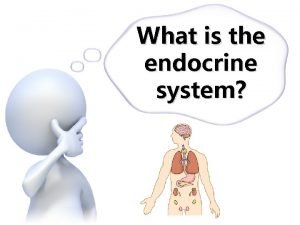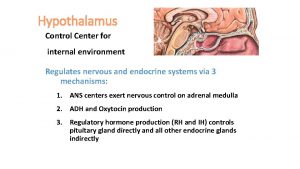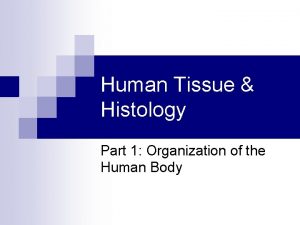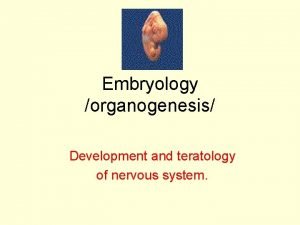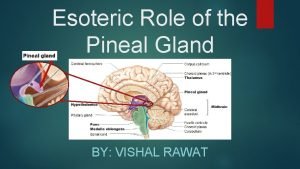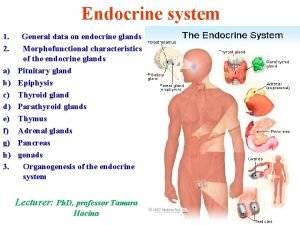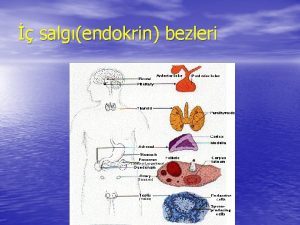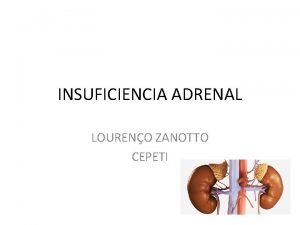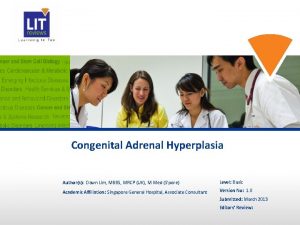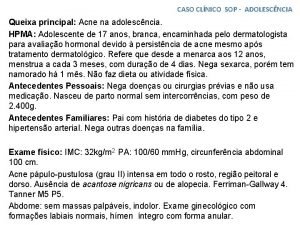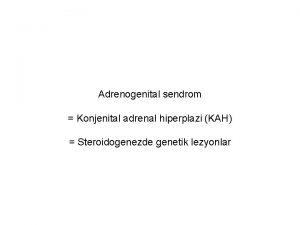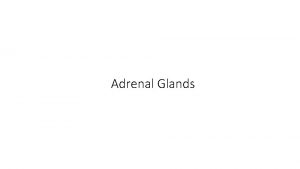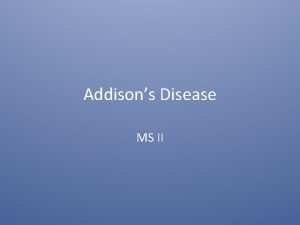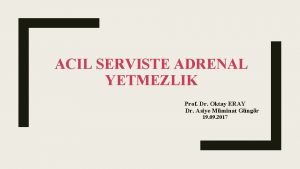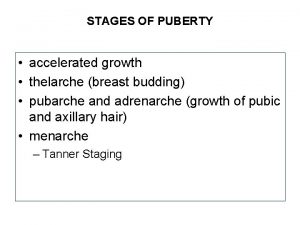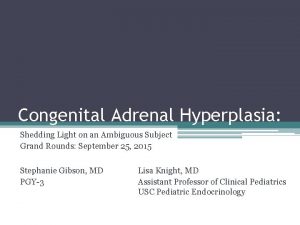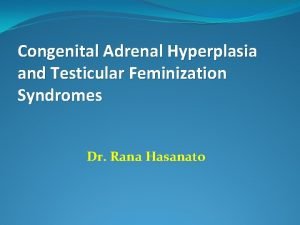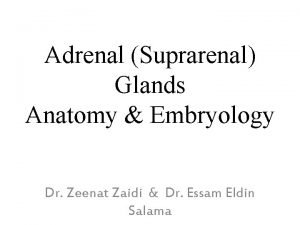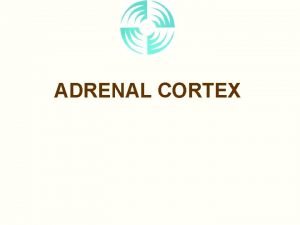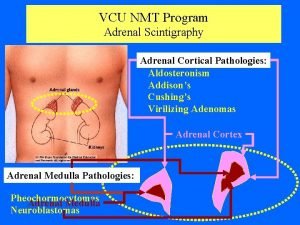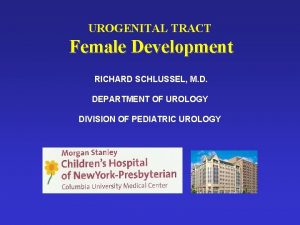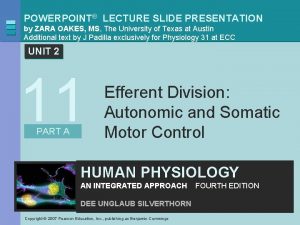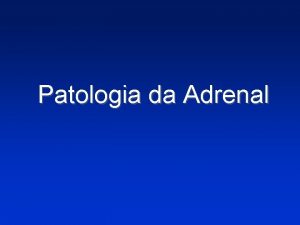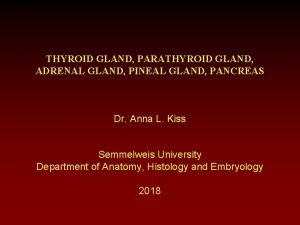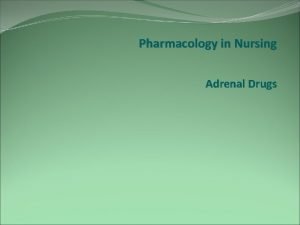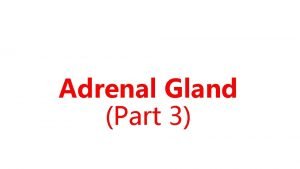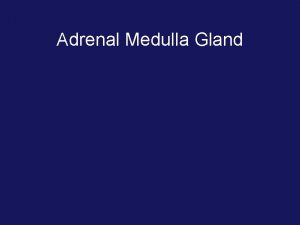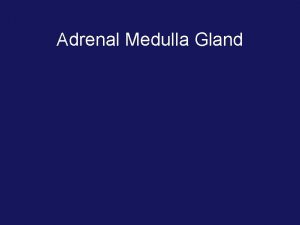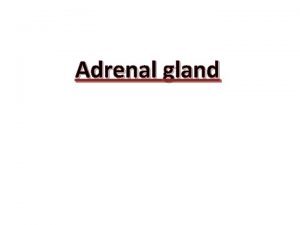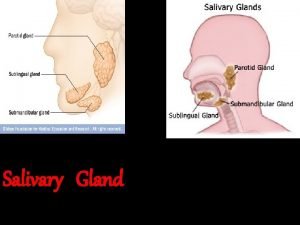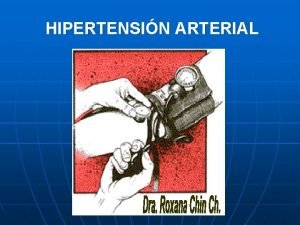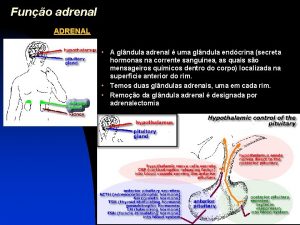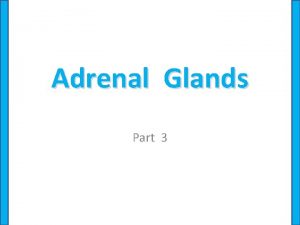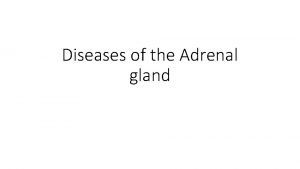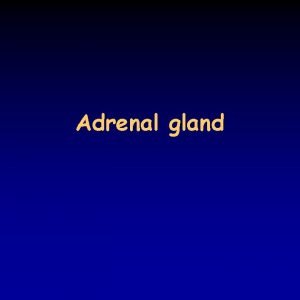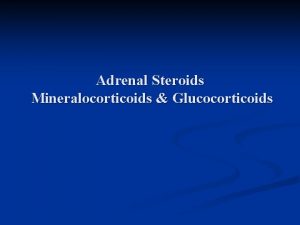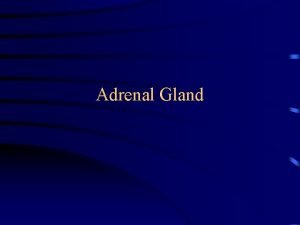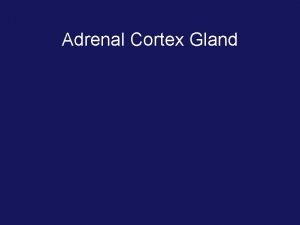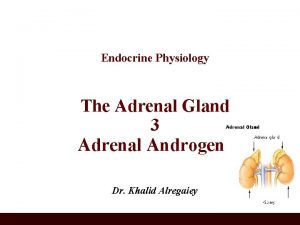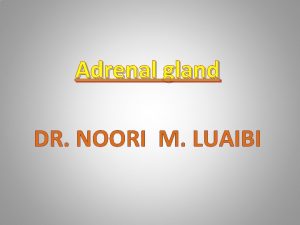ADRENAL GLAND SYMPATHOADRENAL SYSTEM Adrenal Gland 3 arterial

































- Slides: 33

ADRENAL GLAND; SYMPATHOADRENAL SYSTEM


Adrenal Gland • 3 arterial supply sources – Perfuse gland • Periph center • Sinusoids • Medulla receives blood w/ cortex prod’s – Medulla has own arterial supply



• Medulla, cortex diff embryo origins – Cortex from posterior abdominal wall lining – Medullary pheochromocytes from sympathogonia • Neural crest cells • Also give rise to neuroblasts; sympathetic ganglia • SF-1 req’d for adrenal gland dev’t – Also gonads, ventromedial nucleus of hypothal – Also DAX-1 req’d • During dev’t, pheochromoblasts migrate to other areas (aorta, organ of Zuckerkandl)

Adrenal Cortex • Produces steroid hormones • Cholesterol-processing enz’s in s. ER, inner mitoch membr – Tubulovesicular mitoch • Much inner membr surface area • Much P 450 scc • Parenchymal cells can produce cholesterol de novo – Mainly endocytosis of LDL – Cholesterol-rich lipid droplets in cytoplasm • Capsule + 3 cell layers


Adrenal Medulla • Mod’d sympathetic ganglion – BUT no axons at targets – Release catecholamines to ECF bloodstream • Cells = pheochromocytes – Axonless secr cells – Two cell subpopulations • Same cell pop’n under diff physiologic states – Concent cortisol exposure • Noradrenaline (norepinephrine) producing cells • Adrenaline (epinephrine) producing cells – Secrete prod’s from granules ECF by exocytosis

Catecholamines • • • Synth’d from L-tyrosine Dopamine, noradrenaline, adrenaline L-tyr in plasma (1 -1. 5 mg/d. L) Active transport into cells Conversion L-tyr by 4 enz’s – Compartmentalized • Adrenal medulla catecholamine output approx 80% adrenaline – BUT plasma ratio 9: 1 noradrenaline: adrenaline


1) Tyrosine Hydroxylase • Ring hydroxylation to L-DOPA (L-Dihydroxy. Phenyl. Alanine) • Contains Fe+2; tetrahydrobiopterin cofactor • Activity reg’d by preganglionic nerves – Get phosph’n PKA, PKC and calmodulin-dependent kinases • Long-term stim’n upreg’n transcription, translation • Incr’d L-DOPA prod inhib’n

2) DOPA Decarboxylase (aromatic L-amino acid decarboxylase) • Pyridoxal phosphate cofactor • End product in CNS • Stored in secretory vesicles – Enter by active transport – MVATs (Vesicular Mono. Amine Transporters)

3) Dopamine b-Hydroxylase (DBH) • side chain hydroxylation to noradrenaline • Contains Cu; Vit C cofactor • Rxn w/in secretory vesicle • End prod in symp nerves, most central catecholaminergic neural tracts

4) Phenylethanolamine NMethyl. Transferase (PNMT) • N-methylation to adrenaline • Methyl donor = S-Adenosyl. Methionine • Cytoplasmic – Noradrenaline leaves vesicle • Passive transport • Concent gradient – Adrenaline must reenter secretory vesicle • Active transport

PNMT • Expression depends on high local cortisol – From adrenal cortex – Through sinusoid system • Transcr’l activation of PNMT gene through ligand-act’d glucocort receptor – Also other transcription factors • • Also activity stim’d by glucocort Adrenaline prod feedback inhib’n Also found in kidney, lung, pancreas Also nonspecific NMT – Contributes to periph conversion norepi to epi

Secretory Vesicles • Catecholamine storage • Active transport via VMATs – ATP-driven proton pump – In vesicle membranes – p. H, electrical gradient – Antiporter • 12 transmembr helical segments – Related to plasma membr monoamine transporters


Catecholamine Release from Storage Vesicles • ACh rel’d from preganglionic fibers – Nicotinic receptors – Get depol’n pheochromocytes – act’n voltage-gated Ca channels – influx Ca – exocytosis of secretory vesicles • Chromogranins, DBH, ATP, other peptides released

Actions of Catecholamines • Circ’ng catecholamines reach most tissues – BUT cannot penetrate • BBB • Fetus – Fetal prod’n (mostly norepi) through fetal zone • Impt in intrauterine life (cardiovascular responses) • Large • Placenta expresses catecholamine degrading enzymes • Placental norepi transporter – Delivers circ’ng fetal chatechol’s for degrad’n

Adrenergic Receptors • Heptahelical, G-prot-linked transmembr receptors • 2 categories: a and b, subcategories • a – affinity for adrenaline > noradrenaline – a 1 (A, B, D) mostly use Gaq G prot’s • Usually activate PLC ( PKC and DAG and intracell Ca through IP 3) • And/or activate PLA 2 – a 2 (A, B, C) varied • Gai and G 0 couple to decr’d activity adenylyl cyclase • Can act’n K+ channels, inhib’n Ca channels, act’n PLC and/or PLA 2 • b – affinity for adrenaline > noradrenaline • All (1, 2, 3) use Gas G prot act’n ad cyclase


Tissue Receptor Subtype Heart beta 1 Adipose tissue beta 1 beta 3? Vascular Smooth Muscle beta 2 Airway Smooth Muscle beta 2





Physiological Implications of Sympathoadrenal Catecholamines • Gen’l: activates fight/flight mech’s – Mobilizes energy, redist’s blood • Opposes parasymp – Promotes digestion, storage of energy – BUT distinct target cell pop’ns w/in organs • Many targets; overall – Incr’s cardiac output, blood pressure – Bronchodilation matched perfusion w/ incr’d ventilation – Blood diverted from viscera and skin to muscle • Retain blood to brain – Mobilize fuel from energy stores


• Stress sympathoadrenergic, adrenocortical systems activated simultaneously – Catecholamines instantaneous action • From adrenal medulla and symp neurons • Rapid elimin’n w/ end release – Cortisol delayed 20 -30 mins, action prolonged • Involved in body weight regulation – Leptin secr’d by adipocytes • Acts on hypothal decr’d appetite, incr’d energy expenditure – Adipocytes have b 3 receptors • More responsive to norepi – Stim’n receptors enhanced lipolysis red’n fat stores decr’d leptin • BUT apparently not mediated through adrenal medulla

Dopamine • Five receptor types – All G-prot coupled heptahelical – D 1 stim’s adenylyl cyclase • vasodilation in splachnic region – D 2 inhibits adenylyl cyclase • Impt: antihypertensive, natriuretic through autocrine/paracrine mech’s – Opposes aldosterone

Catecholamine Elimination • Short-lived mol’s – 10 sec to 1. 7 min • 50 -60% assoc’d w/ albumin • Elimin’n – At synapse, ISF near symp neurons • Reuptake into nerve terminals • Reenter vesicles via VMAT OR • Become degraded by MAO – In target cells • Degraded by Catechol-O-Methyl. Transferase (COMT) – 5% directly filtered into urine

• MAO – – – In outer mitoch membr Substr’s also serotonin, histamine Oxidizes amino grp aldehydes Further ox’d by nonspecific aldehyde de. Hase Ultimate prod dihydroxymandelic acid (DOMA) • COMT – extraneuronal degradation – Uses SAM as methyl donor – Impt to circ’g catecholamines • Get final conjugation – Sulfate, glucuronate in liver, gut – Excr’n through urine
 Visceral nervous system
Visceral nervous system Relation of adrenal gland
Relation of adrenal gland Summary of adrenal gland
Summary of adrenal gland Cow adrenal gland
Cow adrenal gland Acth
Acth Adrenal gland regions
Adrenal gland regions Fetal pig adrenal gland
Fetal pig adrenal gland Betoderm
Betoderm Adrenal gland regions
Adrenal gland regions Adrenal gland
Adrenal gland Hypothalamus
Hypothalamus Adrenal gland epithelium
Adrenal gland epithelium Rathke
Rathke Pituitary gland and pineal gland spiritual
Pituitary gland and pineal gland spiritual Pineal gland pituitary gland
Pineal gland pituitary gland Adrenal nervous system
Adrenal nervous system Adrenal bez histolojisi
Adrenal bez histolojisi Hipotálamo-hipófise-adrenal
Hipotálamo-hipófise-adrenal Dr dawn lim
Dr dawn lim Hiperplasia adrenal congênita não clássica
Hiperplasia adrenal congênita não clássica 21 alfa hidroksilaz
21 alfa hidroksilaz Zona reticularis gonadocorticoids
Zona reticularis gonadocorticoids Medulla
Medulla Adrenal kriz acilci
Adrenal kriz acilci Congenital adrenal hyperplasia characteristics
Congenital adrenal hyperplasia characteristics Dr wilson adrenal rebuilder side effects
Dr wilson adrenal rebuilder side effects Non classical adrenal hyperplasia
Non classical adrenal hyperplasia Site:slidetodoc.com
Site:slidetodoc.com Adrenal cortex develops from
Adrenal cortex develops from Adrenal medulla cortex
Adrenal medulla cortex Aydede yüz
Aydede yüz Adrenal cushing
Adrenal cushing Vaginal agensis
Vaginal agensis Adrenal sympathetic pathway
Adrenal sympathetic pathway

